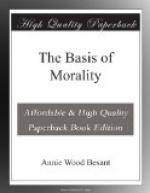Let us first define Morality. It is the science of human relations, the Science of Conduct, and its laws, as inviolable, as sure, as changeless, as all other laws of Nature, can be discovered and formulated. Harmony with these laws, like harmony with all other natural laws, is the condition of happiness, for in a realm of law none can move without pain while disregarding law. A law of Nature is the statement of an inviolable and constant sequence external to ourselves and unchangeable by our will, and amid the conditions of these inviolable sequences we live, from these we cannot escape. One choice alone is ours: to live in harmony with them or to disregard them; violate them we cannot, but we can dash ourselves against them; then the law asserts itself in the suffering that results from our flinging ourselves against it, or from our disregarding its existence; its existence is proved as well by the pain that results from our disregard of it, as by the pleasure that results from our harmony with it. Only a fool deliberately and gratuitously disregards a natural law when he knows of its existence; a man shapes his conduct so as to avoid the pain which results from clashing with it, unless he deliberately disregards the pain in view of a result to be brought about, which he considers to be worth more than the purchase price of pain. The Science of Morality, of Right Conduct, “lays down the conditions of harmonious relations between individuals, and their several environments small or large, families, societies, nations, humanity as a whole. Only by the knowledge and observance of these laws can men be either permanently healthy or permanently happy, can they live in peace and prosperity. Where morality is unknown or disregarded, friction inevitably arises, disharmony and pain result; for Nature is a settled Order in the mental and moral worlds as much as in the physical, and only by knowledge of that Order and by obedience to it can harmony, health and happiness be secured.”
The religious man sees in the laws of Nature the manifestation of the Divine Nature, and in obedience to and co-operation with them, he sees obedience to and co-operation with the Will of God. The non-religious man sees them as sequences he cannot alter, on harmony with which his happiness, his comfort, depends. In either case they have a binding force. The man belonging to any exoteric religion will modify by them the precepts of his Scriptures, realising that morality rises as Evolution proceeds. He does thus modify scriptural precepts by practical obedience or disregard, whether he do it by theory or not. But it is better that theory and practice should correspond. The intuitionist will understand that conscience, accumulated experience, has developed by experience within these laws. The utilitarian will see that the happiness of all, not only of the greatest number, must be ensured by a true morality, and will understand why Happiness is the result thereof. Manu indicates the various




